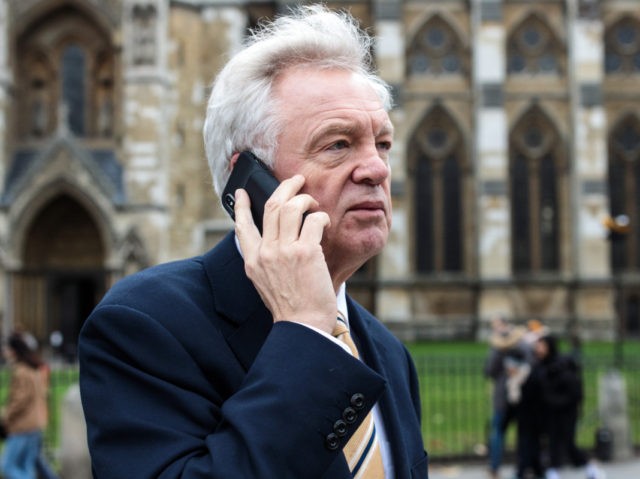Leading Conservative civil libertarian and Brexiteer David Davis has sounded the alarm over the government preparing to award itself wide-ranging special powers to fight the coronavirus pandemic, arguing they should be “open” with what is happening and why.
While the response to the coronavirus outbreak in many countries has seen attacks on individual liberty in the name of public health nothing short of authoritarian, with many even in normally liberal and free countries welcoming crackdowns, some have urged caution over giving governments powers that are too broad and permanent.
Most prominent in the United Kingdom, whose parliament is presently preparing to pass a significant package of emergency powers, is veteran Brexiteer and former Tory leadership contender David Davis. Described by the BBC as a “civil libertarian” who in 2008 resigned in protest over illiberal counter-terrorism legislation, Mr Davis has been leading the effort on introducing several amendments to the bill to increase accountability a sunset clause on its harsh rules.
In an early victory for those concerned about the enormous scope of the emergency legislation, the government on Monday adopted an amendment Mr Davis had led a cross-party group of MPs to propose, stipulating that the new powers should be reviewed after six months, rather than two years as originally planned.
This morning on @BBCr4today, https://t.co/swakuo886w at 7:13, I discussed advice received from Speaker’s Counsel confirming we can use existing powers to tackle this epidemic. This is that advice. pic.twitter.com/8YkNPsF3vJ
— David Davis (@DavidDavisMP) March 23, 2020
This means Parliament will now be able to debate on and decide whether to renew the powers in six months time. But Mr Davis has warned the change doesn’t go far enough, as the amendment appears to merely give Parliament a binary choice to keep all powers unchanged or to do away will all of the powers at once.
Without the ability to change the powers to incorporate what has been learnt in the next six months, or to slowly wind down powers rather than keeping them all at full strength, the six-monthly vote would be nothing more than a “rubber stamp” exercise, Davis said.
The new legislation makes significant changes to medical law in the United Kingdom, and gives broad new powers to authorities, including the police being able to detain members of the public who have not committed a crime for weeks at a time over the possibility they may have coronavirus — even without symptoms.
Another new power is the ability of a doctor to section an individual for mental health reasons without being required to have a second opinion, an enormous power for an individual to wield.
The NHS is also to be protected against claims of medical negligence, which could make it impossible for bereaved families to challenge the NHS if relatives die in their care during the coronavirus outbreak.
Introducing the legislation on Monday, Britain’s health secretary Matt Hancock said of the powers: “[coronavirus is the] most serious public health emergency in a century… and to defeat it, we are proposing extraordinary measures never seen before in peacetime.”
The law is expected to passed by the House of Commons in just one day, and signed off by the House of Lords later in the week.
British Armed Forces to Start Delivering Food and Medical Supplies During Coronavirus Crisis https://t.co/SQsYxGX1tg
— Breitbart London (@BreitbartLondon) March 23, 2020
Such is the extent of this, Tory member of parliament Tom Tugendhat warned the government during Monday’s debate that such powers “could — in different circumstances — be used in a particularly malicious fashion.”
Speaking on Monday morning, Mr Davis told BBC Radio 4 that given the speed with which the emergency law had been drafted it would inevitably be imperfect, and should be improved on when new experience and knowledge was developed in the coming months, rather than passed as a fait accompli and made permanent.
He also questioned the need for the emergency legislation at all, noting that one of the most senior lawyers in Parliament had already issued advice that the public health emergency could be governed through Tony Blair’s 2004 Civil Contingencies Act.
Speculating as to why the government wanted to pass fresh legislation rather than using the already very wide-ranging powers on the statute book, Mr Davis implied it could be down to wishing to avoid accountability at the hands of Parliament.
He said: “[A]s it stands, we’re already using emergency powers under the 1984 Public Health Act, which was designed for epidemics. We could use the Civil Contingencies Act at the drop of a hat. The difficulty from the government’s point of view is they have to come back to Parliament and explain what they are doing, as they are doing it. And maybe they don’t want to do that.”

COMMENTS
Please let us know if you're having issues with commenting.